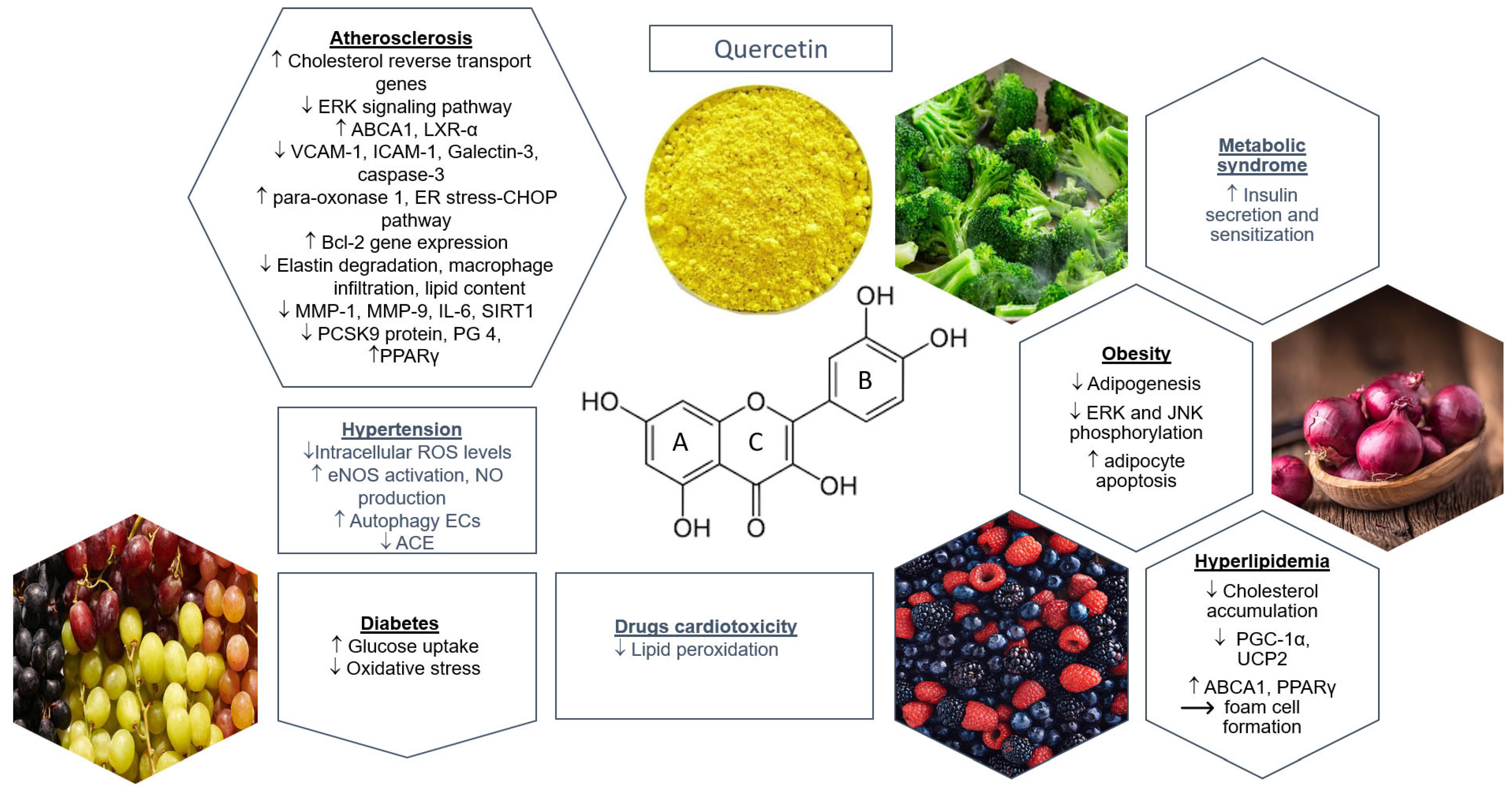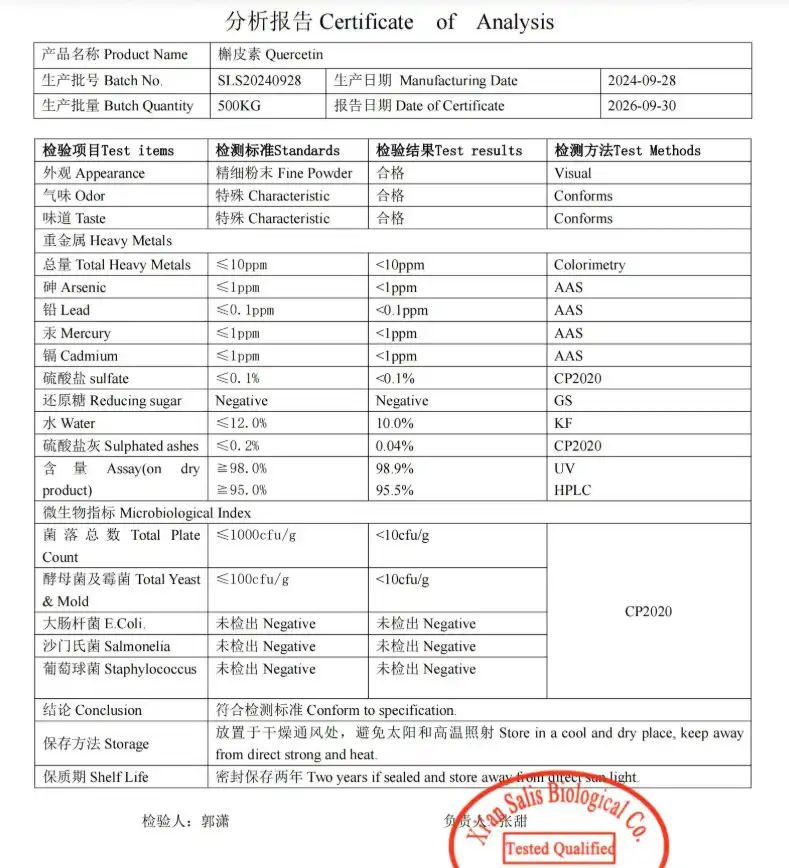Quercetin powder, derived from a naturally occurring flavonoid found in various fruits and vegetables, has gained significant attention for its potential anti-inflammatory properties. This powerful antioxidant has been the subject of numerous studies, demonstrating its ability to combat inflammation in the body through various mechanisms. As inflammation is at the root of many chronic diseases, understanding how quercetin powder can help manage this process is crucial for those seeking natural alternatives to support their overall health and well-being.

What are the mechanisms by which quercetin reduces inflammation?
Quercetin Powder's anti-inflammatory effects are attributed to several mechanisms that work synergistically to combat inflammation at the cellular level. One of the primary ways quercetin exerts its anti-inflammatory action is by inhibiting the production and release of pro-inflammatory cytokines. Cytokines are signaling molecules that play a crucial role in the inflammatory response, and by modulating their activity, quercetin can help reduce overall inflammation in the body.
Another important mechanism is quercetin's ability to inhibit the activity of enzymes involved in the inflammatory process, such as cyclooxygenase (COX) and lipoxygenase (LOX). These enzymes are responsible for producing inflammatory mediators like prostaglandins and leukotrienes. By suppressing their activity, quercetin helps to reduce the production of these inflammatory compounds, thereby alleviating inflammation and associated symptoms.
Quercetin also acts as a potent antioxidant, neutralizing harmful free radicals that can contribute to oxidative stress and inflammation. This antioxidant activity not only helps to reduce inflammation directly but also supports overall cellular health and function. By protecting cells from oxidative damage, quercetin may help prevent the initiation and progression of inflammatory processes in various tissues and organs.
Furthermore, quercetin has been shown to modulate the activity of certain transcription factors, such as NF-κB (nuclear factor kappa B), which play a crucial role in regulating inflammatory gene expression. By influencing these transcription factors, quercetin can help suppress the expression of pro-inflammatory genes, effectively reducing the body's inflammatory response at the genetic level.
Lastly, quercetin has been found to enhance the production and activity of anti-inflammatory compounds in the body, such as interleukin-10 (IL-10). These anti-inflammatory mediators help to balance the immune response and promote resolution of inflammation, further contributing to quercetin's overall anti-inflammatory effects.
How does quercetin compare to other anti-inflammatory supplements?
When comparing Quercetin Powder to other anti-inflammatory supplements, it's important to consider its unique properties and mechanisms of action. While many anti-inflammatory supplements target specific pathways or inflammatory mediators, quercetin stands out for its multifaceted approach to combating inflammation.
One of the key advantages of quercetin is its broad spectrum of activity. Unlike some supplements that focus on a single aspect of inflammation, quercetin addresses multiple inflammatory pathways simultaneously. This comprehensive approach may make it more effective in managing complex inflammatory conditions that involve various mechanisms.
Compared to omega-3 fatty acids, another popular anti-inflammatory supplement, quercetin works through different mechanisms. While omega-3s primarily exert their effects by promoting the production of anti-inflammatory eicosanoids, quercetin's action is more diverse, targeting cytokine production, enzyme inhibition, and antioxidant activity. This makes quercetin a valuable complement to omega-3 supplementation, potentially offering synergistic benefits when used together.
Curcumin, derived from turmeric, is another well-known anti-inflammatory supplement. Like quercetin, curcumin has multiple mechanisms of action, including NF-κB inhibition and antioxidant effects. However, quercetin may have an advantage in terms of bioavailability, as it is more easily absorbed by the body compared to curcumin, which often requires special formulations to enhance its absorption.
When compared to traditional non-steroidal anti-inflammatory drugs (NSAIDs), quercetin offers a natural alternative with potentially fewer side effects. While NSAIDs primarily work by inhibiting COX enzymes, quercetin's broader range of action may provide more comprehensive anti-inflammatory benefits without the risk of gastrointestinal side effects associated with long-term NSAID use.
It's worth noting that quercetin's effectiveness as an anti-inflammatory agent may vary depending on the specific condition and individual factors. While some studies have shown promising results, more research is needed to fully understand how quercetin compares to other anti-inflammatory supplements in various clinical settings.
Can quercetin powder be used to treat specific inflammatory conditions?
Quercetin Powder has shown potential in addressing various inflammatory conditions, making it a subject of interest for researchers and healthcare practitioners alike. While more clinical studies are needed to establish definitive treatment protocols, existing research suggests that quercetin may be beneficial in managing several specific inflammatory conditions.
One area where quercetin has shown promise is in the treatment of allergic conditions, such as allergic rhinitis and asthma. Its ability to inhibit the release of histamine and other inflammatory mediators from mast cells and basophils makes it a potential natural antihistamine. Some studies have reported improvements in allergy symptoms and reduced reliance on conventional medications when quercetin is used as a complementary therapy.
In the realm of cardiovascular health, quercetin's anti-inflammatory and antioxidant properties may help reduce the risk of atherosclerosis and other inflammatory cardiovascular conditions. By modulating inflammation in the blood vessels and improving endothelial function, quercetin may contribute to overall heart health and potentially reduce the risk of cardiovascular events.
Quercetin has also been investigated for its potential role in managing inflammatory bowel diseases (IBD), such as Crohn's disease and ulcerative colitis. Its ability to modulate gut inflammation and support intestinal barrier function makes it an interesting candidate for IBD management. While more research is needed, some preliminary studies have shown promising results in reducing inflammation markers and improving symptoms in IBD patients.
In the field of rheumatology, quercetin's anti-inflammatory properties have been explored for potential benefits in conditions like rheumatoid arthritis and osteoarthritis. By inhibiting pro-inflammatory cytokines and enzymes involved in joint inflammation, quercetin may help alleviate pain and improve joint function in these conditions. However, larger clinical trials are needed to confirm its efficacy and determine optimal dosing regimens.
Neuroinflammation, which is implicated in various neurodegenerative disorders, is another area where quercetin's anti-inflammatory effects are being studied. Preliminary research suggests that quercetin may have neuroprotective properties, potentially helping to reduce inflammation in the brain and slow the progression of conditions like Alzheimer's and Parkinson's disease.
It's important to note that while quercetin shows promise in addressing these inflammatory conditions, it should not be considered a standalone treatment. Rather, it may be most effective when used as part of a comprehensive approach to managing inflammation, which may include dietary changes, lifestyle modifications, and other therapeutic interventions as recommended by healthcare professionals.
Conclusion
In conclusion, quercetin powder offers a multifaceted approach to combating inflammation in the body. Its ability to modulate various inflammatory pathways, coupled with its antioxidant properties, makes it a promising natural supplement for those seeking to manage inflammatory conditions. While more research is needed to fully understand its potential in treating specific disorders, the existing evidence suggests that quercetin may be a valuable addition to anti-inflammatory regimens. As with any supplement, it's essential to consult with a healthcare professional before incorporating quercetin powder into your health routine, especially if you have pre-existing medical conditions or are taking medications.
If you are also interested in this product and want to know more product details, or want to know about other related products, please feel free to contact lea_slsbio@163.com,WhatsApp+86 13193326505.

References
1. Li Y, Yao J, Han C, et al. Quercetin, Inflammation and Immunity. Nutrients. 2016;8(3):167.
2. Boots AW, Haenen GR, Bast A. Health effects of quercetin: from antioxidant to nutraceutical. Eur J Pharmacol. 2008;585(2-3):325-337.
3. Mlcek J, Jurikova T, Skrovankova S, Sochor J. Quercetin and Its Anti-Allergic Immune Response. Molecules. 2016;21(5):623.
4. Salvamani S, Gunasekaran B, Shaharuddin NA, Ahmad SA, Shukor MY. Antiartherosclerotic effects of plant flavonoids. Biomed Res Int. 2014;2014:480258.
5. Salaritabar A, Darvishi B, Hadjiakhoondi F, et al. Therapeutic potential of flavonoids in inflammatory bowel disease: A comprehensive review. World J Gastroenterol. 2017;23(28):5097-5114.
6. Haleagrahara N, Miranda-Hernandez S, Alim MA, Hayes L, Bird G, Ketheesan N. Therapeutic effect of quercetin in collagen-induced arthritis. Biomed Pharmacother. 2017;90:38-46.
7. Khan H, Ullah H, Aschner M, Cheang WS, Akkol EK. Neuroprotective Effects of Quercetin in Alzheimer's Disease. Biomolecules. 2019;10(1):59.
8. D'Andrea G. Quercetin: A flavonol with multifaceted therapeutic applications? Fitoterapia. 2015;106:256-271.
9. Andres S, Pevny S, Ziegenhagen R, et al. Safety Aspects of the Use of Quercetin as a Dietary Supplement. Mol Nutr Food Res. 2018;62(1):1700447.
10. Xu D, Hu MJ, Wang YQ, Cui YL. Antioxidant Activities of Quercetin and Its Complexes for Medicinal Application. Molecules. 2019;24(6):1123.

